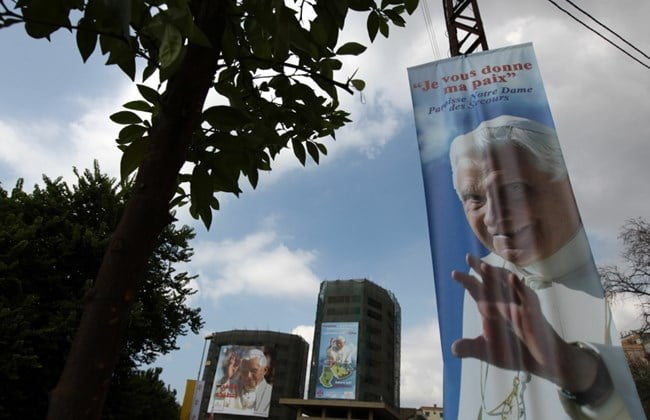The violence, bickering and clashes may have calmed down somewhat over the last couple of weeks, but the visit of Pope Benedict XVI still comes at a crucial time for Lebanon, and the region.
With Lebanese leaders of all religious and political backgrounds joining to welcome the pope ahead of his visit, the pontiff’s trip has already proven to be a unifying force for the country, when so many other issues threaten to divide parts of the population.
But mere appreciation is not enough, and all actors must show genuine commitment to the messages which the pope is set to deliver, especially religious pluralism and tolerance, and all efforts must be made to avoid the temptation of hijacking the visit for one’s own ends. The pope’s visit, of course, is for Christians, but it is also for all Lebanese, and all people of the region, at this acutely difficult time.
The pope is also expected to speak to the Christians of the Middle East on their role within the region. He will remind them of the need to remain in their homelands in an effort to stem the tide of emigration since the Iraq War, and which looks set to be rekindled today amid fears that the Arab Spring is becoming increasingly extremist-led in some parts.
His visit should emphasize the unique role that Christians play in this part of the world, a region which espoused multiculturalism before the concept even existed. While recognizing the challenges faced, the pope must stress that without the Christians of the Middle East, the region would lose its distinctive flavor and its historic character.
The position of Christians, as well of course of Muslims, is in jeopardy across the Holy Land, and also in the birthplace of Jesus himself. Less likely to be discussed, but an issue which the Vatican is well aware of, is that of Israel, the creation of which was one of the most tragic events of the last century and one which has continued to destabilize the region ever since. Christians in Palestine face problems other than just religious extremism – whether Jewish or Muslim – with dire living and economic conditions, a crippling side effect of the state of Israel.
Hopefully the main focus of the pope’s message while he is Lebanon will be that of mutual religious tolerance: that while people may have different ways of reaching or finding God, they are not enemies and that respecting someone’s faith does not mean giving up one’s own.
At this crucial juncture for the region, when religious intolerance is revealing itself in increasingly warped and evil forms, it is vital more than ever that the forces of good are allowed to prevail. The region must again become an example to the rest of the world of religious coexistence, a sphere in which people are free to express themselves and their beliefs without fear of retribution.
SOURCE: THE DAILY STAR


